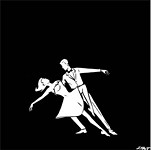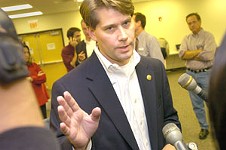Election 2004: Endorse-o-rama!
Hitting the (Dem) party circuit
By Amy Smith, Fri., March 5, 2004
It is almost impossible to win an election without first winning the backing of some of these political clubs. The process of securing endorsements can leave less-experienced candidates bitter and disillusioned and, in some cases, convinced that the system is rigged. But as local political operatives see it, there is nothing "rigged" about candidates getting a jump on their campaigns by joining the clubs, getting to know the club members, enlisting their friends into the clubs (even paying their dues in some instances), and then making sure those people show up when the groups vote on endorsements.
"Surprise! Endorsement meetings are just like an election," said Glen Maxey, former lawmaker and political consultant. "It's pure retail politics – you win by knowing the constituents and making sure your people turn out to vote."
Emotionally charged races can lead to some extremely competitive candidate forums, as this year's battle between 200th District Court hopefuls Gisela Triana – Maxey's candidate in the race – and Jan Soifer has proven time and again. Triana's campaign enrolled some 30 new members of the North by Northwest Democrats in January so they'd be eligible to vote at the group's February endorsement meeting; Maxey's aide Rick Cofer covered the $10 membership dues for several of the Triana supporters, according to NXNW President Joe Comstock. "Gisela got over 30 votes," he said. "That's pretty close to the number of people [her campaign] signed up – and she won by two votes." Soifer's campaign also enrolled new members, Comstock said.
Maxey defends the Triana membership drive. "Ten different campaigns bought memberships in that club," he said. "But when [Cofer] took a handful of memberships over there, he gets accused of packing the meeting." This year, the Austin Tejano Democrats chose to head off any membership-packing efforts by only giving 10 days notice of its endorsement meeting; like many other clubs, ATD requires newcomers to be members for at least a month before the endorsement vote. Some groups allow lapsed members to bring their dues up to date on the same day the votes are cast.
It's not uncommon for people to belong to multiple Democratic clubs, particularly if they're heavily involved in electoral politics as boosters, behind-the-scenes manipulators, or aspiring electeds like Triana herself, whose membership drive has led to a clean sweep of Dem-club endorsements. On the other hand, Triana has been less active in the Travis Co. Bar Association, which is where Soifer has directed a good bit of her extracurricular energy. Soifer was rewarded with the highest score in the recent bar poll.
Being a familiar face on the club scene is especially helpful for candidates in down-ballot races that receive little or no press coverage. "I was active in the Democratic Party for 12 years before I even decided to run for office," says Nancy Hohengarten, a Court-at-Law No. 5 candidate who has earned most of the endorsements in that three-way race. "If you're not active in the party before you run for office, you're not going to get the support." The effort doesn't stop there. Most elected officials keep their memberships current in several clubs, she said. "It's just something you do."
Veteran Democratic consultant David Butts says the clubs serve as a handy way to reach voters – particularly those groups that distribute their own mailers and door-hangers or lend shoe-leather support to candidates – and that making contact with those club leaders is one of the first things a candidate should do. It's hard to get membership lists from most groups, but politicos who've been around long enough know how to reach the right people. Butts advises prospective candidates to start running as early as possible. "They should call on the club leaders individually and meet with as many as possible one-on-one," he said. "It's human nature – people influence people. So it boils down to which candidate can out-hustle the other."
Added consultant Mike Blizzard: "There's an element of personal relationship at play, and at times a professional relationship. And obviously you have to work these [endorsement] meetings. I showed up at one meeting and was appalled at the lack of grassroots effort – there were no campaign signs, no stickers anywhere." Blizzard confesses that he had to learn these things the hard way, when he was first starting out. "You have to work it like an election," he said. "It's as open a process as it could possibly be."
Got something to say on the subject? Send a letter to the editor.










